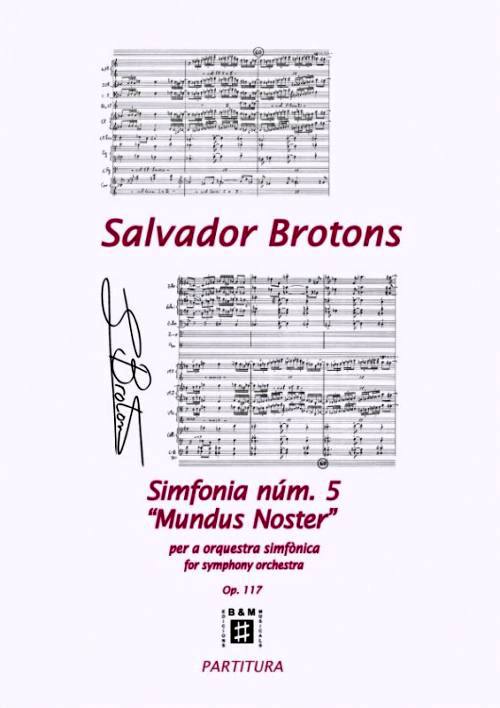Description
Author
Format
Instrumentation
Plantilla
Duration
Pages
Year of composition
ISMN
Ref.
Composed during the summer of 2010 and commissioned by the Orquestra Simfònica de Barcelona Nacional de Catalunya, the Symphony No. 5 “Mundus Noster” has a form nearer to that of a symphonic poem than to pure music. With the intention of establishing a closer communication with the listener, I have chosen to present situations of our contemporary world in a musical context. In the first three movements I have sought to represent objective realities and situations of our contemporary society. The last movement, however, is a more personal vision on how to confront, from an individual perspective, our surroundings.
Instead of labeling the movements with Italian expressions of tempo, I have preferred to encapsulate the situations by expressing them through specific titles. Thus, in the first movement I set forth separately the first incongruence of our world: power (wealth) and misery (poverty). I present power in the brass and the timpani with a solemn character. The answer from poverty comes, at first, from the static strings, but they become mournful with a melody which grows in tension under a lament in the violas. The ambition creates a vivid space in time, where the themes of power and misery are manipulated frenetically within a great agitated crescendo which tries to grow bigger and bigger. The accumulated energy is such, that in the end it suddenly explodes.
The second movement starts with a slow introduction, as a sort of reflection, in the low register of the ‘cellos, accompanied by the diaphanous and consonant harmonies of the harp and the vibraphone. Suddenly, the musical language changes to set forth the hypocrisy in a grotesque polka following a waltz of false and deceitful lyricism. The harmonies are dissonant (clusters) and seek to express the hypocritical world which is so common nowadays.
The third movement, as the second one, also starts in a slow and reflexive space, but this time in the high register of the strings (violin and viola solos) with a more elevated and contemplative vision. The contrast arrives with the violence of the percussion in the fast tempo of the music. With an insistent, continuous rhythm, the violence of our world is illustrated by the wars and aggressive conflicts of humanity. In its central part, heroic sounds of the personal “egos” are represented in a more triumphal music.
Finally, in the last movement a more positive resolution is foreseen. It is an entire slow movement with diverse phases of evolution. It starts in the most profound depression with a lament where the oboe stands out supplicating justice beneath a chaotic world in the strings and brass. Once the ambience calms down, hope appears with a peaceful new melody in the strings and the harp. The harmonic texture and counterpoint become gentle and tonal. The music rises and arrives at a transparent space (glockenspiel, harp and vibraphone) which later culminates in the individual excelling over the environment. Distant chords, in C major, can be heard in the strings which are finally taken up by the brass in a more affirmative and vehement end.



















There are no reviews yet.